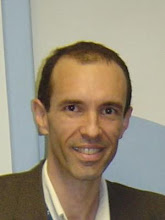[Post com versão em PT, mais abaixo]
Yet another so worth spreading idea from TED Talks: Clay Shirky discusses what he calls "cognitive surplus" - the free [brain] time available in the world, once destined to waste in sofa surfing (or, at best, to enrich someone's own culture in reading or other positive use of time). Now, with the social web, cognitive surplus is being seen as what it is: an untapped resource (the simplistic view) and a fundament for civism and activism (the more enlightened, encompassing view).
So now you can say to that someone who just can't grasp the reality that knowledge society is here: "Hey, T-Rex! Some folks got filthy rich using free cognitive surplus - Google, YouTube, Twitter, etc." - if money is still the only thing T-Rex understands. Then, if T-Rex falls for that, you can say "See, complex systems are different from what you are familiar with. Shirky talks about this study in daycare centers in which they established a fine for late pick-ups and what happened? Late pick-ups grew, not declined. Not that things are always the opposite you expect, but in a complex world you must be prepared to get answers opposite to your expectation."
That would be a good start. But wait!... if T-Rex is in government, you better forget it. S(He) either already got it or will never get. Well... maybe just send him/her the link to Clay Shirky's TED Talk (below, after Portuguese version):
Eis outra idéia que vale muito espalhar: Clay Shirky discute o que chama de "excedente cognitivo" - o tempo [cerebral] livre disponível no mundo, antigamente destinado ao desperdício surfando (ou babando) no sofá (ou, no melhor dos casos, ao aprimoramento cultural de alguém na leitura ou outra atividade enriquecedora individualmente). Agora, com a Web social, o excedente cognitivo está sendo visto como o que é: um recurso imenso e não usado (numa visão simplista) e um fundamento do civismo e do ativismo (numa visão mais esclarecida e abrangente).
Então agora dá para dizer: "Ei! Dinossauro, uns caras ficaram podres de ricos usando o excedente cognitivo grátis - Google, YouTube, Twitter etc." (se dinheiro for a única coisa que o troglodita entende). Daí, se o dinossauro cair nessa cantada, dá para emendar: "Olha só: os sistemas complexos são diferentes das coisas que você está acostumado a entender. O Shirky falou de um estudo em creches, no qual criaram uma multa para pais que pegam seus filhos com atraso e o que aconteceu? Os atrasos aumentaram, não diminuíram. Não que as coisas vão ser sempre assim, mas num mundo complexo você precisa estar preparado para ter resultados opostos aos que você esperava".
Isso seria um bom início. Mas... espera! Se o dinossauro for gestor público, esqueça. Ou ele/a já entende a sociedade do conhecimento, ou não vai entender nunca. Bem... talvez, pelo menos, mande para ele/a o link da palestra do Clay Shirky nas TED Talks (sempre leva um tempo para aparecer a tradução em legendas, meu chute é que em 10/07/2010 já se possa acompanhar com legendas em português):






